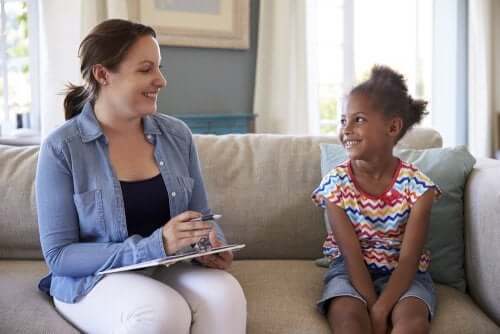When to Go to a Child Psychologist

Parenting doesn’t come with an instructions manual. Although we try to do our best, we may sometimes feel overwhelmed and need to ask for help. Going to a child psychologist can generate doubts and fears, but it’s the right decision on many occasions.
What is normal?
At some point, almost all parents wonder if their child’s behavior is normal and temporary or should they worry? Don’t despair. It’s important to know that, in their evolutionary process, children go through different stages with characteristic behaviors that help them develop as people.
For example, when children are two years old, they enter a stage of negativism and tantrums that’s perfectly normal. Similarly, it’s common for children up to seven years of age to find it difficult to stay focused or regulate their behavior if they’re excited.
That is, certain behaviors or fears may be totally adequate at a certain age and cease to be so as the child grows. On the other hand, the child’s personality also plays a decisive role; an introverted child will enjoy being alone, while a more restless one will require additional external stimuli.

Before cataloging a behavior as problematic, we must clearly identify if it’s part of the developmental stage that our children are going through or if it’s part of their personality.
At times, it’s also possible for the focus of the intervention to actually be the parents and not the child. We may be too demanding or overprotective of our child, which causes us to have an unrealistic notion of childhood. If this occurs, a psychological intervention dedicated to orienting parents can solve the situation.
When should you go to a child psychologist?
Unfortunately, there’s still some taboo regarding the decision to go to a child psychologist. Some parents may think that it’s not really necessary or may see it as a sign of weakness.
Seeking professional help doesn’t mean that you’re a bad parent or that you’ve done something incorrectly. On the contrary, it only shows that you want to provide the best education and childhood for your kids.
There are some situations that can certainly be corrected over time. When there’s a change in the child’s life, such as a divorce or going to another school, it may only take time to adjust to the new situation. However, it’s important to be alert in case that adaptation doesn’t occur.
Likewise, if we believe it necessary, it may be appropriate to go to a child psychologist to help the child get through that stage. Sometimes, prevention is the best medicine, and having that support can prevent circumstances from affecting your children in a negative way or overwhelming them.
On the other hand, we must bear in mind that there are situations in which it’s better to act as soon as possible. Otherwise, the symptoms may get worse or chronic and the children will be missing part of their childhood for as long as we don’t provide a solution.

Key points to keep in mind
The main parameters that we must pay attention to when deciding whether to go to a child psychologist are the following:
- Behaviors that aren’t normal. Either because our children present very different behaviors from the rest of the kids their age or because their behaviors change radically from one day to another. This is why it’s important to know our children’s evolutionary stages and their personality.
- Time. If abnormal behavior or mood persists for several months, we should start considering going to a professional. It may mean that the children aren’t able to face the situation by themselves and need help.
- Influence in their daily life. If a behavior, fear, or emotional state significantly affects the child’s daily life and well-being, let’s seek help. Even if this hasn’t been going on for a long time, if the occurring effect is significant, we don’t have to wait.
- Physical symptoms without medical explanation. If the child begins to have frequent headaches, stomach aches, or skin problems without medical justification, we may find ourselves facing the somatization of some emotional problem.
Parenting doesn’t come with an instructions manual. Although we try to do our best, we may sometimes feel overwhelmed and need to ask for help. Going to a child psychologist can generate doubts and fears, but it’s the right decision on many occasions.
What is normal?
At some point, almost all parents wonder if their child’s behavior is normal and temporary or should they worry? Don’t despair. It’s important to know that, in their evolutionary process, children go through different stages with characteristic behaviors that help them develop as people.
For example, when children are two years old, they enter a stage of negativism and tantrums that’s perfectly normal. Similarly, it’s common for children up to seven years of age to find it difficult to stay focused or regulate their behavior if they’re excited.
That is, certain behaviors or fears may be totally adequate at a certain age and cease to be so as the child grows. On the other hand, the child’s personality also plays a decisive role; an introverted child will enjoy being alone, while a more restless one will require additional external stimuli.

Before cataloging a behavior as problematic, we must clearly identify if it’s part of the developmental stage that our children are going through or if it’s part of their personality.
At times, it’s also possible for the focus of the intervention to actually be the parents and not the child. We may be too demanding or overprotective of our child, which causes us to have an unrealistic notion of childhood. If this occurs, a psychological intervention dedicated to orienting parents can solve the situation.
When should you go to a child psychologist?
Unfortunately, there’s still some taboo regarding the decision to go to a child psychologist. Some parents may think that it’s not really necessary or may see it as a sign of weakness.
Seeking professional help doesn’t mean that you’re a bad parent or that you’ve done something incorrectly. On the contrary, it only shows that you want to provide the best education and childhood for your kids.
There are some situations that can certainly be corrected over time. When there’s a change in the child’s life, such as a divorce or going to another school, it may only take time to adjust to the new situation. However, it’s important to be alert in case that adaptation doesn’t occur.
Likewise, if we believe it necessary, it may be appropriate to go to a child psychologist to help the child get through that stage. Sometimes, prevention is the best medicine, and having that support can prevent circumstances from affecting your children in a negative way or overwhelming them.
On the other hand, we must bear in mind that there are situations in which it’s better to act as soon as possible. Otherwise, the symptoms may get worse or chronic and the children will be missing part of their childhood for as long as we don’t provide a solution.

Key points to keep in mind
The main parameters that we must pay attention to when deciding whether to go to a child psychologist are the following:
- Behaviors that aren’t normal. Either because our children present very different behaviors from the rest of the kids their age or because their behaviors change radically from one day to another. This is why it’s important to know our children’s evolutionary stages and their personality.
- Time. If abnormal behavior or mood persists for several months, we should start considering going to a professional. It may mean that the children aren’t able to face the situation by themselves and need help.
- Influence in their daily life. If a behavior, fear, or emotional state significantly affects the child’s daily life and well-being, let’s seek help. Even if this hasn’t been going on for a long time, if the occurring effect is significant, we don’t have to wait.
- Physical symptoms without medical explanation. If the child begins to have frequent headaches, stomach aches, or skin problems without medical justification, we may find ourselves facing the somatization of some emotional problem.
All cited sources were thoroughly reviewed by our team to ensure their quality, reliability, currency, and validity. The bibliography of this article was considered reliable and of academic or scientific accuracy.
- de Piaget, T. D. D. C. (2007). Desarrollo Cognitivo: Las Teorías de Piaget y de Vygotsky.
- Masuello, A. S. (1933). Introversión Extroversión. Jung, 86.
This text is provided for informational purposes only and does not replace consultation with a professional. If in doubt, consult your specialist.








